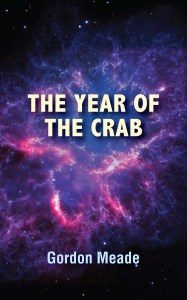The Year of the Crab
 There are times when life throws us into trying situations that isolate us from the understanding of others. In 2014 Gordon Meade was diagnosed with cancer. In his 9th poetry collection he takes the reader on a full tour of the battlefield – from the diagnosis to the battle itself and finally, its positive verdict. The Year of the Crab is split into three parts, each relating to a different place the poet has lived in.
There are times when life throws us into trying situations that isolate us from the understanding of others. In 2014 Gordon Meade was diagnosed with cancer. In his 9th poetry collection he takes the reader on a full tour of the battlefield – from the diagnosis to the battle itself and finally, its positive verdict. The Year of the Crab is split into three parts, each relating to a different place the poet has lived in.
The book is immersive; it reads like a diary, full of Meade’s personal feelings and struggles. This is not a collection of complex, poetic language or convoluted metaphors (although that is not to say there are no powerful metaphors within). Some poems are just a sentence or two split into lines and stanzas and therefore feel like they try to convey more than they really stand for. I have to admit, after going through the first couple of pages I started to assume that the collection would just be 80 pages of simple, direct sentences elevated to the status of poetry due to the difficult topic. I’m happy to admit I was wrong.
I strongly believe that only few selected poems in the collection, if presented on their own, would make a great impact upon the reader. Combined, they create a story, something inherently private and cohesive. Meade, with an air of honesty and openness, conjures an atmosphere of pain, fear and sorrow, but also hope and appreciation. At times he expresses it through the description of a regular encounter at the hospital, but he also finds other means, such as nature or classical mythology. One of the most touching poems in the collection uses an animal to show the anxiety and distress of being limited in the face of cancer:
At first glance it looks as if The oystercatcher has missed Its chance, has left it far too late To escape the incoming tide, Hopping haphazardly from one Submerging outcrop of stone To another. I almost find Myself fearing for its survival Until I remember it can fly. [‘Canute - On Oystercatchers’]
This helplessness, the feeling of lack of one’s importance, is amplified in the more day-to-day poems, where Meade merges the current reality with Greek mythology. In ‘Damage Limitation’ he describes a visit to the clinic, comparing the doctor to an oracle; overwhelmed by loneliness and a lack of support:
I leave the office of the oracle
none the wiser; just another cancer patient,
a passenger, without a ticket, arriving
at a station after the last train has gone. [‘Damage Limitation’]
As the book progresses, the atmosphere gets more potent. The plain language grows in meaning and even though the words are still quite basic, the reader now knows the road that led to them being uttered.
‘There is nothing fancy about cancer’ – these words figure on the back cover of the book and stand to summarise the overall collection: a genuine and direct read. After reading a couple of poems, what’s not fancy becomes desired the most. For it’s not in the simple words that it’s found, but in the simple images that suddenly become powerful metaphors, brutal or hopeful. In this dichotomy Meade finds his reality; torn between living and dying, he craves comfort.
Despite Meade overcoming cancer, this collection is not about that – it accounts for the process, not the outcome. Although some poems are hopeful, the poet is open about his darkest thoughts and they set the tone of the entire collection. In his search for comfort he realises that regardless of the outcome, he might never find it:
I wish I could be sure whether or not its head was still there. It would dramatically change how this poem might end; imagining either the seal’s blank eyes, staring out across the freezing firth, or its stump of neck being cured, in some ridiculous way, by the occasional spray of salt. [‘Coastal Erosion’]

[…] Crab, by Gordon Meade, an ‘immersive’ book, which begs to be read as a whole. On the Dundee University Review of the Arts, Szczepaniak […]